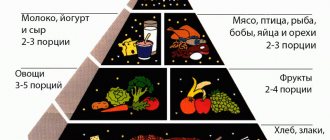Why are carbohydrates needed?
It should be remembered that all carbohydrates in foods are broken down in the body into glucose, which is a source of energy, stimulates thinking and mental activity, nourishes nerve cells, starts the processes of digestion and respiration, and is spent on physiological needs.
Therefore, it is not recommended to give up carbohydrates under any circumstances. You just need to determine which carbohydrates are healthy and which are harmful.
A deficiency of carbohydrate-containing foods in the diet leads to diseases of the heart and blood vessels, impairs memory, provokes headaches, muscle cramps, reduces concentration and the ability to perform mental stress. Therefore, it is important to know the optimal carbohydrate intake.
Simple carbohydrates = prepared foods
While some simple carbohydrates come from unprocessed foods such as dairy products, fruits and vegetables, most of them come from processed foods. These carbohydrates are added sugars. They may be indicated on the label as: - sugar (sucrose); - corn syrup, invert syrup; - glucose (dextrose), grape sugar; - fructose; - fruit juice concentrate, etc.
healthy replacements for simple carbohydrates that will help satisfy sweet cravings.
The benefits and harms of carbohydrates
The structural unit of all carbohydrates is saccharides. Healthy carbohydrates differ from harmful ones in their chemical composition and number of structural units. In this regard, they distinguish:
- Monosaccharides - consist of one structural unit (fructose or glucose) and are absorbed in the body instantly.
- Disaccharides are a combination of two structural units and, like monosaccharides, are classified as simple carbohydrates.
- Polysaccharides contain three or more units, and due to their complex molecular formula, they are broken down slowly in the body, which is why they are called slow carbohydrates.
Simple carbohydrates
Simple carbohydrates are harmful to the body. They instantly appear in the blood and increase sugar levels. These include glucose, fructose and their various compounds. Products containing quickly digestible carbohydrates are:
- Sugar is a combination of glucose and fructose (sucrose).
- Fruits, sweets, milk (it contains lactose - milk sugar), some vegetables.
Among vegetables, potatoes are considered a conditionally harmful product, since the breakdown of starch-containing substances produces maltose - it contains two glucose molecules, which are fast carbohydrates.
Complex carbohydrates
Complex carbohydrates include: fiber, dietary fiber, glycogen, pure starch. Their advantage is their slow absorption. The body receives the energy it needs and manages to spend it, so fat is not deposited.
Sources of slow digestion carbohydrates are:
- Cereals, durum pasta.
- Bread products made from wholemeal flour.
- Legumes (except soybeans).
- Vegetables (cabbage, greens, pumpkin, cucumbers, tomatoes).
- Unsweetened varieties of fruits, berries.
Healthy carbohydrates are absorbed slowly and do not cause spikes in blood sugar. The absorption of a well-thought-out carbohydrate breakfast takes 3.5-4 hours - the entire period the person feels full.
Foods containing complex carbohydrates based on the glycemic index
When following a diet, as well as in the presence of a disease such as diabetes, you need to take into account the level of the glycemic index. He should be short. The table shows products with a low index and the required polysaccharide content:
| Product | Glycemic index | Product | Glycemic index | Product | Glycemic index |
| Green pea | 40 | Figs | 35 | Apple | 30 |
| Grape | 40 | Natural yogurt | 35 | Lentils | 25 |
| Corn grits | 40 | Dried apricots | 35 | Cherry | 22 |
| Orange juice | 40 | Carrot | 35 | Grapefruit | 22 |
| Apple juice | 40 | Pear | 34 | Apricot | 20 |
| Beans | 39 | Peanut | 32 | Eggplant | 10 |
| Rye bread | 39 | Banana | 30 | Broccoli | 10 |
| Wholemeal pasta | 38 | Soy milk | 30 | Tomato | 10 |
| Orange | 35 | Peach | 30 | Sunflower seeds | 8 |
It is very important to combine products correctly. So, carbohydrate foods are not combined with fats. Therefore, it is worth observing separate meals. But proteins and carbohydrates are compatible. Only if polysaccharides are not present in berries or fruits. Including slow carbohydrates in your diet will reduce the number of unhealthy snacks and normalize the functioning of the entire digestive system.
Separately complex polysaccharides are best eaten for breakfast. Thus, a person receives a charge of strength and energy potential. Their breakdown will take a long time, which means the feeling of hunger will not come soon. So, you can maintain your figure without compromising your health.
Absorption of healthy carbohydrates
Due to the fact that complex carbohydrates are absorbed gradually, they participate in a weight loss program and promote weight loss. To assess the usefulness of products, the glycemic index is used, which characterizes the rate of absorption of substances by the body. The amount of carbohydrates consumed per day is also important.
Potatoes are included in the list of complex carbohydrates, however, their glycemic index is high and they are quickly absorbed. In addition, potatoes contain large amounts of sugar. This must be taken into account when drawing up a carbohydrate menu for a diet.
Fiber and starch
These two components represent two types of difficult-to-digest carbohydrates. Fiber is especially important because it promotes bowel regulation and helps control cholesterol levels.
The main sources of dietary fiber are:
- fruits
- vegetables
- nuts
- beans
- whole grains
Starch is also found in some fiber foods. The difference is that some foods are considered more starchy than fibrous, such as potatoes.
Video
Other foods high in starch:
- whole wheat bread
- wheat
- corn
- oats
- peas
- rice
What complex carbohydrates are is the key to long-term health and weight loss. They make it easier to maintain your weight and may even help protect against type 2 diabetes and cardiovascular problems in the future.
Healthy carbohydrates for weight loss
Foods containing carbohydrates that are healthy and promote weight loss are:
- Bran, oats, peas, lentils, beans.
- Apples, citrus fruits, berries.
- Barley, buckwheat, brown rice.
- White cabbage and all other types of cabbage.
Unlike fast carbohydrates, the substances in these products contain dietary and plant fibers, which improve intestinal motility, normalize metabolic processes, and create beneficial microflora in the intestines.
Norm of carbohydrates per day
To create a healthy menu, it is important to adhere not only to the correct list of products, but also to take into account the amount of food consumed. It is necessary to develop a weight loss program taking into account the carbohydrate intake.
If you do not take this indicator into account and consume slow carbohydrates in excessive quantities, your body weight will inevitably increase. Strict consumption monitoring is required.
Effective in matters of weight normalization is interaction with a nutritionist-endocrinologist, who, based on the patient’s current state of health, develops a personal scheme and table of carbohydrate consumption in foods.
In Zelenograd, such care is provided at the Axis Medical Center. Consultations with a nutritionist will help you determine the sources of carbohydrates and their quantity.
Why are mono- and polysaccharides needed?
Carbohydrates perform the main function in our body - energy. The body synthesizes about 60% of energy thanks to poly- and monosaccharides. And only 40% comes from proteins and fats. Now do you understand how important these substances are?
Simple carbohydrates very quickly replenish lost energy. But it is also quickly consumed and the body requires supplements. To gain weight, your diet includes both simple and complex carbohydrates. They are also indispensable if you lead an active lifestyle. Polysaccharides or complex carbohydrates supply the body with energy slowly. You don't feel hungry longer.
The ratio of polysaccharides, monosaccharides and fiber in the diet should be 70% / 25% / 5%
Those. Most of all, you need to consume complex carbohydrates every day. Simple saccharides should make up 1/3 of the daily carbohydrate intake. For many, it’s the other way around: for a snack at work, we drink tea with buns and sweets. Hence the excess weight.
For those who want to lose weight, be sure to read my article - how many carbohydrates do you need per day when losing weight.
Description and functions of carbohydrates
Carbohydrates
is a broad class of organic compounds that perform a huge number of functions. These are integral structural components in all tissues of the human body and consist of two chemical elements: carbon and water.
This is the main source of energy - and therefore the life of our cells. Their content varies significantly depending on the functions performed by the organ - for example, the concentration of glucose in the nervous tissue of the brain reaches 0.5 grams/kg.
- Energy
― this is the main source of energy necessary for the normal maintenance of all physiological processes and functions in the body. This is a substrate that, undergoing a series of biochemical processes, will ultimately be sent as firewood to the furnace of mitochondria. In this, of course, the most important role goes to glucose - it is the main actress of the metabolic performance unfolding on stage.
- Structural
- carbohydrates are part of various components of cells, in particular: nucleic acids (DNA and RNA), which ensure the storage and transmission of hereditary information; glycolipids and glycoproteins located in all tissues and organs of the human body - including the brain and spinal cord.
- Protective
― mucus and joint fluid, of which they are components, protect cell surfaces from various types of damage.
In combination with proteins, they form antibodies, interferons, complement components - in other words, they actively participate in immune defense reactions.
Plasma albumins and globulins, blood clotting factors - all these substances also contain carbohydrate molecules.
- Signal function
- are part of various cellular receptors and ligands.
Remember your high school biology lessons: long carbohydrate chains, called glycocalyx, are anchored into cell membranes. This is somewhat reminiscent of the branched tentacles of an octopus, which extend in all directions, providing intercellular interaction and selectivity in relation to chemical substances entering the body.
- Regulate osmotic pressure
- one of the main parameters of homeostasis.
- Storage
- the liver pantry is prudently filled with glycogen jam.
- Detoxification
- glucuronic acid neutralizes toxic indirect bilirubin by binding to it; as well as various rotting products.
- Included in coenzymes
and other biologically active substances (for example, ATP).
- Carbohydrates can form lipids
,
amino acids
and other compounds.
The role of fast carbohydrates in metabolism
Although at first glance it may seem that simple sugars and fast carbohydrates provoke stress for the body, a sharp jump in insulin and result in extra centimeters on the waist, but you also cannot do without them.
The simple structure of fast carbohydrates allows them to quickly enter the bloodstream. Hence their advantage - if you need urgent energy, foods with fast carbohydrates saturate you instantly. This is true, for example, after a morning workout. The body receives glucose in a short time, and its deficiency usually results in:
- fainting,
- fatigue,
- irritability,
- lack of performance.
At the same time, you need to remember that after a few hours there will be no trace of the surge of strength left, and therefore you need to prepare for a healthy meal that will provide energy for 3-5 hours or more.
Abuse of foods high in fast carbohydrates leads to extreme stress on the pancreas and liver. After all, it is she who produces insulin. Another vulnerable organ is the adrenal glands. But most often, due to an uncontrolled craving for sweets, starchy foods, or fast food, a person runs the risk of developing pancreatitis. Simple carbohydrates, which turn out to be fast, are most often empty calories. They are usually filling, so our body simply does not need so many calories, which means it will store them in reserve - on the organs and under the skin. The formation of fat is closely related to the process of insulin production. It is with his participation that fast carbohydrates turn into fat. The production of insulin in excess of the norm affects the breakdown of fat so that it contributes to the increase in adipose tissue.
What foods contain polysaccharides?
To clearly understand what complex carbohydrates are, look at the table; it presents a list of weight loss products, where GI is the glycemic index.
| Product | GI |
| Yeast dough, beans | 50 |
| Peas, whole grain bread | 40 |
| Skim milk, apples | 35 |
| Dried beans, pasta, fresh fruit | 30 |
| Whole milk, prunes | 22 |
| Eggplant, green beans, cauliflower | 15 |
This table clearly shows that the glycemic index of the products is low, which means that these products are slow, that is, dietary. You can safely eat them and lose weight. But don't overdo it - remember that excess sugar that is not absorbed as energy is stored as fat. Print the table and hang it on the refrigerator so you don’t mix anything up.











